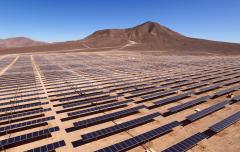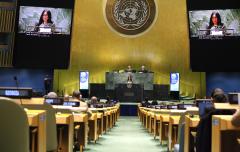Solid indicators proposed for SDG7; Global Tracking Framework ready to support
New York – The UN Statistical Commission has held its annual meeting of national experts, with an extraordinary task at hand: to agree on a global indicator framework for the Sustainable Development Goals (SDGs). The global indicator framework is proposed by the 28 national experts of the Inter-Agency and Expert Group for SDG indicators (IAEG-SDGs).
The indicators proposed for SDG7 on energy are technically solid and have been proved measurable. The more than 20 agencies involved in the Sustainable Energy for All Global Tracking Framework (GTF) have already worked together to measure progress based on almost identical indicators, across close to 200 countries, and this consortium stands ready to support governments in their efforts.
“With SDG7 now agreed, and its indicators in the process of being decided upon, we will even further align the Global Tracking Framework with what is needed to support monitoring of SDG7 indicators. The consortium is confident and committed to continuing this work,” said Vivien Foster of the World Bank and the SEforALL Knowledge Hub.
Work is ongoing to further develop a multi-tier framework for energy access, to determine not just who has access, but also the quality of that access. This is an important aspect of SDG7, captured by its focus on affordability, reliability and sustainability.
“In the context of SDGs, we cannot overstate the importance of reliable data, including for policy formulation,” said Philipp Charwath, the Deputy Permanent Representative of Austria to the UN. “It is very encouraging to see the efforts of the SEforALL Global Tracking Framework. I wish we could have such a tool for every SDG.”
The World Bank and the International Energy Agency coordinate the SEforALL Global Tracking Framework, in close partnership with the Statistical Division of UN DESA, WHO, UN-Energy, IRENA and over 20 other UN and international organizations.
At an event on 8 March during the week-long UN Statistical Commission, Ms. Foster said that while the next edition of the Global Tracking Framework is scheduled for 2017, the consortium would produce updates this year to inform the thematic, global, regional and national reviews at the High-Level Political Forum for Sustainable Development in July.
Several other key members of the SEforALL GTF consortium also participated in the event, including the International Renewable Energy Agency (IRENA), the World Health Organization (WHO), the Global Alliance of Clean Cookstoves (GACC), and the International Network on Gender & Energy (ENERGIA).
“Having reliable and good data helps to attract finance and push the agenda forward,” said Yera Ortiz de Urbina of IRENA. “IRENA has made this a priority for our work, including through collecting data from countries every year. We stand ready to support.”
Read other statements and suggestions from Global Tracking Framework members at the event:
- Link to IRENA’s information hub with latest data & statistics, country profiles, technologies and markets (Ms. Yera Ortiz de Urbina, IRENA)
- Monitoring SDG target 7.1., indicator 7.2. (Heather Adair-Rohani, WHO)
- Statement by the International Energy Agency (Dan Dorner, IEA)
- Suggestions on SDG indicators by ENERGIA and the Global Alliance for Clean Cookstoves
Sefuiva Reupena Muagututia, Samoa’s member of the IAEG-SDGs, used the opportunity to remind everyone of the crucial importance of capacity-building to be able to monitor SDG indicators appropriately.
“The issue of capacity building is really a big challenge for small island developing states, for SIDS,” he said. “Data on all the indicators cannot be compiled by small agencies. So the big question is when we will be able to monitor all the indicators. This is also an important issue for the IAEG-SDGs. It is necessary to mobilize assistance for small island developing states to develop their own capabilities to follow-up on the relevant indicators.”
The SEforALL Global Tracking Framework consortium is working hard to ensure credible technical capability and quality support where needed.
Photo copyright: Power Africa



